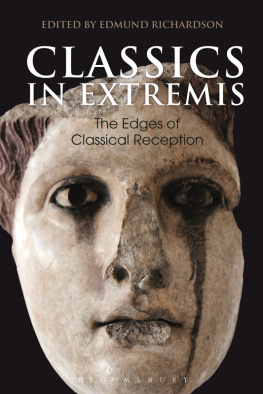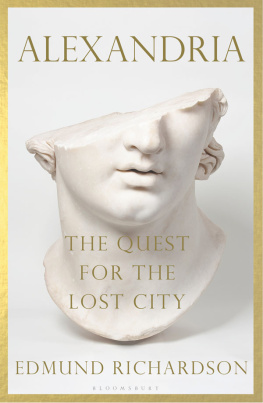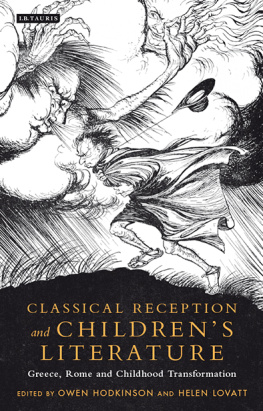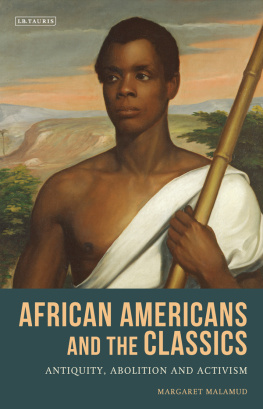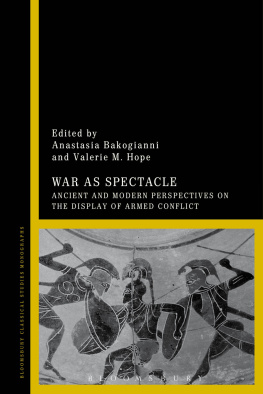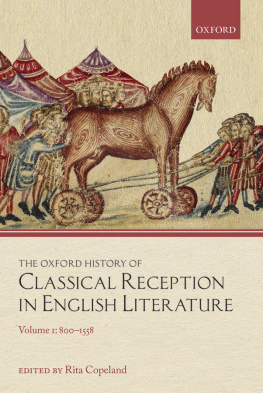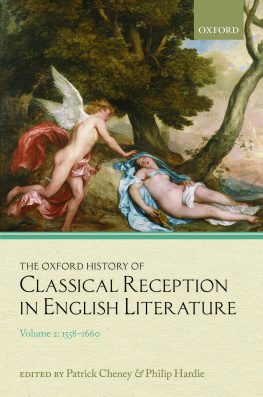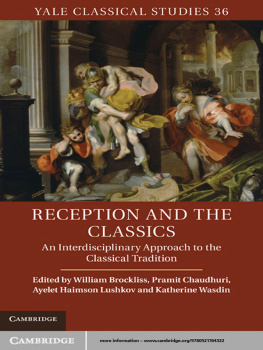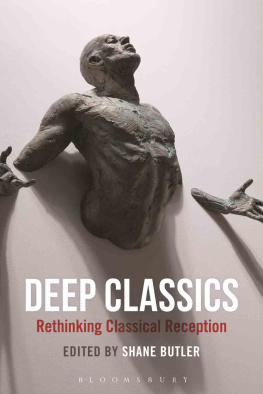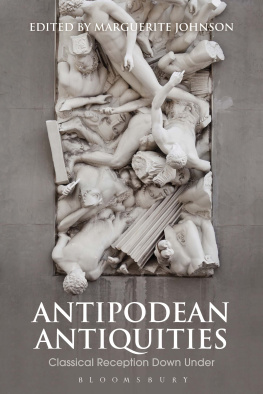CLASSICS IN EXTREMIS
Bloomsbury Studies in Classical Reception
Bloomsbury Studies in Classical Reception presents scholarly monographs offering new and innovative research and debate to students and scholars in the reception of Classical Studies. Each volume will explore the appropriation, reconceptualization and recontextualization of various aspects of the Graeco-Roman world and its culture, looking at the impact of the ancient world on modernity. Research will also cover reception within antiquity, the theory and practice of translation, and reception theory.
Also available in the Series:
ANCIENT GREEK MYTH IN WORLD FICTION SINCE 1989
edited by Justine McConnell and Edith Hall
ANCIENT MAGIC AND THE SUPERNATURAL IN THE MODERN VISUAL AND PERFORMING ARTS
edited by Filippo Carl and Irene Berti
GREEK AND ROMAN CLASSICS IN THE BRITISH STRUGGLE FOR SOCIAL REFOR
Medited by Henry Stead and Edith Hall
HOMERS ILIAD AND THE TROJAN WAR
Naose Mac Sweeney and Jan Haywood
IMAGINING XERXES
Emma Bridges
JULIUS CAESARS SELF-CREATED IMAGE AND ITS DRAMATIC AFTERLIFE
Miryana Dimitrova
OVIDS MYTH OF PYGMALION ON SCREEN
Paula James
THE CODEX FORI MUSSOLINI
Han Lamers and Bettina Reitz-Joosse
THE GENTLE, JEALOUS GOD
Simon Perris
VICTORIAN CLASSICAL BURLESQUES
Laura Monrs-Gaspar
VICTORIAN EPIC BURLESQUES
Rachel Bryant Davies
CLASSICS IN EXTREMIS
THE EDGES OF CLASSICAL RECEPTION
Edited by Edmund Richardson

Rosa Andjar is Deputy Director of Liberal Arts and Lecturer in Liberal Arts at Kings College, London. Her current research focuses on two distinct but complementary areas: ancient Greek tragedy (especially the tragic chorus) and Hellenic classicisms in Latin America.
Maarten De Pourcq holds the Chair of Literary and Cultural Studies at Radboud University Nijmegen in the Netherlands. His main research interest is reception history and reception theory in the twentieth and twenty-first centuries.
Edith Hall is Professor of Classics at Kings College, London. She is Co-Founder and Consultant Director of the Archive of Performances of Greek and Roman Drama at Oxford, and Chairman of the Gilbert Murray Trust. She has published extensively on the reception of ancient Greece and Rome, and directed the AHRC-funded project Classics and Class in Britain (17891939).
Lorna Hardwick is Professor Emerita of Classical Studies at the Open University, founding editor of Classical Receptions Journal and director of the Classical Receptions in Late Twentieth Century Drama and Poetry in English project. Her publications in the field of classical reception include Translating Words, Translating Cultures (2000) and New Surveys in the Classics; Reception Studies (2003). She is the author of articles on tragedy and epic poetry and their reception, and on translation, and is co-editor of the Oxford University Press Classical Presences series, as well as a number of books on classical reception.
Jennifer Ingleheart is Professor of Classics at Durham University. Her research focuses on Latin poetry (particularly the works of the elegists and Catullus), its relationship with politics and culture, and its reception (including its translation history). Her edited volume Ancient Rome and the Construction of Modern Homosexual Identities was published by Oxford University Press in 2015. Her next book will explore the queer classics of Philip Gillespie Bainbrigge (18901918).
Laura Jansen is Senior Lecturer in Classics and Comparative Literature at the University of Bristol. She is the author of Borges Classics: Global Encounters with the Graeco-Roman Past (Cambridge, 2018), editor of The Roman Paratext: Frame, Texts, Readers (Cambridge, 2014), and general editor of the monograph series Classical Receptions in Twentieth-Century Writing (Bloomsbury). She is currently writing a second monograph titled Classical Transcultures: Italo Calvino, Umberto Eco and Alberto Manguel.
Amanda Klause received her PhD in Classics from Princeton University in 2017, and is currently teaching at the Academy of Notre Dame de Namur in Villanova, PA. In addition to early modern translation practice, her research interests include Roman imperial literature and ecocriticism.
Alexia Petsalis-Diomidis is Lecturer in Classics at the University of St Andrews. She publishes on material culture and Greek literature of the Hellenistic and Roman periods, particularly non-elite voices in the areas of religion, travel and the body. She also works on classical reception in the nineteenth-century Ottoman Empire.
Edmund Richardson is Associate Professor of Classics at Durham University, and Director of the Durham Centre for Classical Reception. He was named one of the BBC/AHRC New Generation Thinkers for 201617. His book Classical Victorians: Scholars, Scoundrels and Generals in Pursuit of Antiquity was published by Cambridge University Press.
Henry Stead is a Leverhulme Early Career Fellow at the Open University. He was awarded the first Michael Comber Studentship for Classical Reception Studies by the Open University and St Hildas College, Oxford. His first book, A Cockney Catullus, was published in 2015 by Oxford University Press. His current project, Brave New Classics (19171956), explores the impact of the Russian Revolution on British culture through the lens of contemporary engagement with the Greek and Roman classics.
Jennifer Wallace teaches in the Faculty of English, Cambridge University, and has been researching in the field of classical reception in its widest definition for many years. Her publications include Shelley and Greece: Rethinking Romantic Hellenism (1997), The Cambridge Introduction to Tragedy (2007) and The Oxford History of Classical Reception in English Literature, 17901880 (2015), co-edited with Norman Vance. She is currently writing a book entitled Witnessing Tragedy since 9/11 and editing A Cultural History of Tragedy in the Modern Age, both for Bloomsbury.
Edmund Richardson
For I am every dead thing,
In whom Love wrought new alchemy.
For his art did express
A quintessence even from nothingness,
From dull privations, and lean emptiness;
He ruind me, and I am re-begot
Of absence, darkness, death: things which are not.
John Donne, Nocturnal upon St. Lucys Day
In the dying days of 2017, I found myself considering alternative titles for this volume. Classics in Extremis: A Survival Guide. Classics in Extremis: Reclaiming the Ancient World. Classics in Extremis: [insert controversy of the day here]. Classics comes at you fast, these days.
Accustomed to fighting off charges of their irrelevance, And much (much) more in the same vein.
How we talk about the classical past, display it, teach it, adapt it, remember it and forget it (and who gets to be one of us, doing this) has always been charged and political. This volume is (more or less accidentally) a manifesto for those who seek to engage the highly politicized classics of today: it explores how such battles have been fought (and won), often against the steepest of odds, throughout the afterlives of antiquity. The questions at stake about whom the ancient world belongs to, and who gets to participate in classical discourse turn out to have been in play for a very long time. There has rarely been a moment where the classical past has not been a battleground, a clashing of extremes. For many readers of, and contributors to, this volume, classics is political may have a very different resonance than when this project was first conceived in 2014. But that is just another way of saying: classical reception happens to you, too.
Next page
